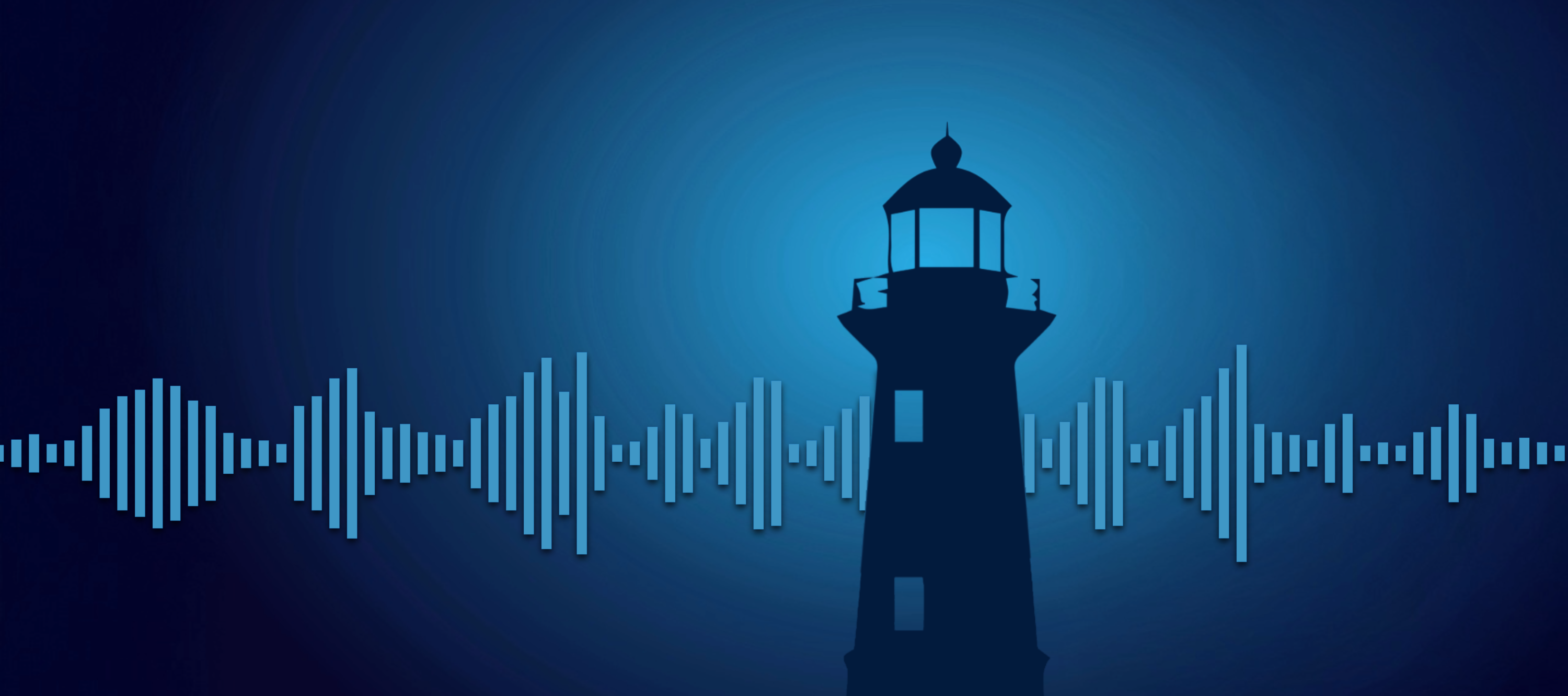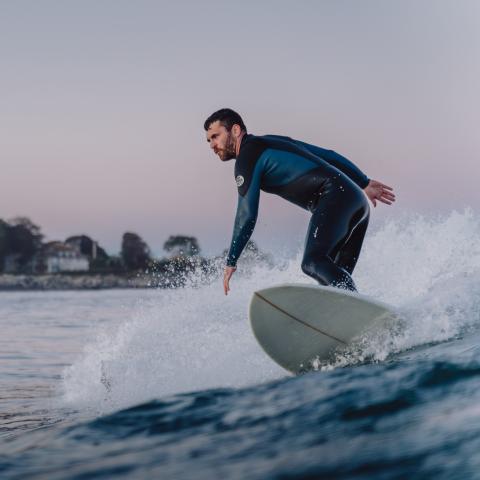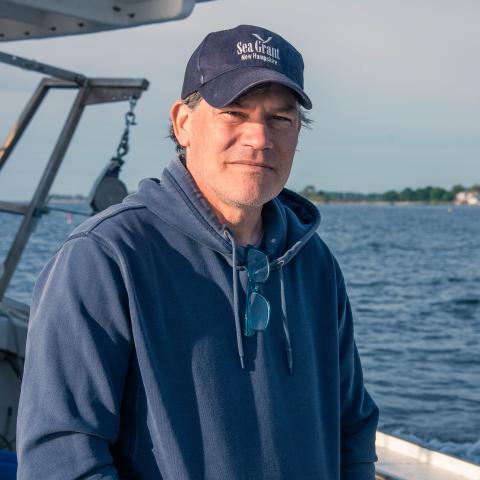Introducing Time and Tide: A Podcast By New Hampshire Sea Grant

Show Notes
What does the saying "time and tide wait for none" mean to you? Those with a connection to the coast understand that tides are a certainty in life – something that we have no control over – just as time is always fleeting. It’s a familiarity that connects all of us, and sometimes, is a starting point for conversation. Time and Tide is a new podcast from New Hampshire Sea Grant exploring the science, stories, and people behind our changing coastlines.
Hosts Brian Yurasits and Erik Chapman will share one story each month, covering the coastal and marine topics that you might read about in your local news. These stories are told by scientists, local experts, and community members in a manner that is conversational, informative, and relatable. Whether you’re a surfer, fisher, seafood lover, enjoy long walks on the beach, or simply someone who cares about the future of our coastal places—this podcast is for you.
In this introductory episode, you'll hear why talking about the tides is a great ice-breaker, learn why you should care about the issues facing the Granite State’s small, but mighty coastline, and take a trip down memory lane with Brian and Erik. Float along with us as we navigate time and tide together!
Meet your Hosts

Brian Yurasits, Host & Producer
Science Communication Specialist,
New Hampshire Sea Grant

Erik Chapman, Ph.D., Co-host
Director, New Hampshire Sea Grant
Interim Director, UNH School of Marine Science and Ocean Engineering
Episode Transcript
Brian Yurasits: [00:00:00] Every day the ocean comes and goes. Like a clockwork tide marking time itself, but hidden in its rhythms are stories of resilience, of change, and of connection. Stories that shape our coasts, our communities, and the people who call this place home. I'm Brian.
Erik Chapman: And I'm Erik Chapman.
Brian Yurasits: And this is Time and Tide, a podcast by New Hampshire Sea Grant. Together we'll explore the pulse of the ocean and its impact on our lives. From the fishers who pull their livelihood from its depths to the scientists, diving into its mysteries, to the artists inspired by its beauty. Because just like the tide, these stories ebb and flow connecting all of us in ways that we are only now beginning to understand.
Welcome to time and tide.[00:01:00]
Every other week we'll dive headfirst into a new topic in coastal science that you should care about if you breathe, air, eat lobster, rolls, cod, or any other seafood, or you just like the feeling of sand between your toes without the microplastics. From coastal resilience...
Talia Sperduto: People are so funny because until they're literally like right on the precipice, until their house is sinking into the water, they seem to have a lot of tolerance.
Brian Yurasits: To fisheries and invasive species...
Elizabeth Fairchild: So one set of their fins is modified to form a sucker like a suction cup, and they hatch out of eggs with that sucker so they stick to any available smooth surface
Brian Yurasits: and even marine debris and emerging toxins...
Paula Mouser: PFAS is regulated in New Hampshire in drinking water, and in that case you're ingesting it in in large amounts and so the regulatory levels are fairly low. They're in the low part per trillion. In surface [00:02:00] waters, we're not generally drinking that water, we might be interacting with it in a different way.
Brian Yurasits: Erik and I will do our best to make sense of the coastal topics that you hear about in your communities by talking with and learning from local experts. Scientists and people with a broad range of perspectives and experiences. Follow today and swim at the current scientific happenings in the granite state. What does the saying "time and tide wait for none" mean to you?
Erik Chapman: Time and Tide, no matter what we're doing, no matter where we are, they are not changing for us, for anyone. And so for me, it immediately puts us in the position of, okay, hey, what, what, uh, you know, what are we gonna do with the time that we have?
As the time and tide continue to kind of march on. For me, it's sort of a prompt, okay, you know, we gotta take advantage of the time that we have. Time is not [00:03:00] waiting. Tide is not waiting. We need to think about what we can do, steps we can take to make the world a better place for ourselves and the natural world that we rely on for so many of the things that give us the quality of life that we want to have.
Brian Yurasits: Exactly, and, and time is one of the most limited resources on the planet. And when you think of a lot of coastal issues, time is of of the essence. And to me, time and tide are common denominators between anyone who uses our ocean and coastal resources in any way, shape or form. So whether you fish, you surf, you swim or you just want to go down to the beach, you are beholden to the time and the tide. For anyone who uses the ocean, these are uniting factors that we all need to adapt our lives around so that I just personally think it's a great starting point for conversations between any person who can relate to loving and using and experiencing all that the [00:04:00] ocean has to offer. So we understand that many of our listeners out there may not be familiar with Sea Grant or the work that we do. Um, so Erik, it would be amazing if you could just explain in your own words, what is Sea Grant and, and what do we do here?
So Sea Grant is an organization, we're based at the University of New Hampshire, and we have one foot in the university environment and one foot sort of in the real world. And our job is really to work with communities to identify challenges and then to work with researchers, extension folks, communicators, and folks who work in education to generate solutions to those problems. We work in four different focus areas, so we distribute our work in sustainable fisheries in aquaculture, resilient communities and economies, uh, healthy coastal ecosystems and environmental literacy and workforce development. So we kind of have all the bases covered. So we don't just fund research or extension and outreach or education, but almost everything we do combines different approaches. 'cause ultimately, I think that's kind of what [00:05:00] works to solve problems. It's not just one tool that you have in the toolbox, but usually all the tools that you have at your at your, uh, disposal.
I've gotta say, Erik, it's almost like you've talked about this before.
Erik Chapman: You know, I think you'll hear on, on all of our episodes in this series.
We'll be talking to people that we, people in organizations that we partner with to do the work that we do.
Brian Yurasits: And these aren't just other organizations, these are community members, they are people from all walks, walks of life along the seacoast and inland. They're, they are connected to our work in one way or another .
Erik Chapman: At the very origin of the work are the communities and the ecosystems that we're working on behalf of.
Brian Yurasits: I feel like we owe our listeners a little bit of an introduction to who we both are. Sure. And how we both landed at New Hampshire Sea Grant.
Erik Chapman: So I'm the Director of New Hampshire Sea Grant. My job is to support the people that actually do the work on the ground.
Ironically, I mean, I grew up in Hanover, New Hampshire. An hour and 45 minutes from the coast and really kind of in the foothills of the white mountains. So I really was not kind of an ocean [00:06:00] or beach person. I was a mountain and river and lake kind of person. I was really connected to those. I got a master's in wildlife ecology studying riparian management on farms.
So this is also not connected to the ocean, but I loved working with farmers and thinking about ways that they could continue to, to use the landscape to produce food, but do so in ways that supported, a healthy stream ecosystem. But when I finished, my first opportunity for a position was to work in Antarctica studying Adelie penguins, and I just loved learning about the physics and chemistry and biology of the ocean and how that, how the complex processes that occur in the ocean drive biology in ways that supports different species of penguins in different ways. So that was my hook. I was hooked on the ocean and it was the science and it was the mystery. And it was the, the combination of I think, science and art, which is trying to understand, you know, what is happening in the ocean and how it's [00:07:00] affecting organisms that we care about, including ourselves.
After working with penguins that came to UNH as a part of a research program that was studying bluefin tuna, and it just blew my mind getting in a boat and seeing bluefin tuna schools of bluefin tuna breaking the surface offshore of where I grew up. I grew up not really understanding and being connected to the full depth and excitement of the ocean, and that was just sort of a glimpse of kind of what is possible and what's out there.
So when I started to learn about Sea Grant and what they do, I was really drawn to the focus on applied research. So as soon as I started to learn sort of this blend of research extension, outreach, and communications, and focusing that on tangible issues that matter to the people of New Hampshire, I was hooked on Sea Grant.
So that's what I love about my position. I love about working with people. The 'connecting tissue' is just love for and need for sustaining healthy [00:08:00] ecosystems.
Brian Yurasits: That's the through line. So I'm, I'm hearing a really incredible arc from the hard sciences, biology, physics, and then blending that into more of the social sciences and working, working with people, economics, policy. My background similarly, I got my master's in Marine Conservation and policy at Stony Brook University in New York. And immediately, well, after a short stint as a piping plover monitor, right after that I worked as a fisheries observer. But, uh, that's where I really got my sea legs.
Got to go out, work with a lot of the, the commercial fishermen, mostly on trawl and gill net boats in the Northeast. And that really opened me up to working with the people who are at that working waterfront. It was really like the school of hard knocks in a way. Um, you move straight from the, the university where you're just diving into books and learning about all the biology, ecology of our coasts, straight away to working out at sea with commercial fishermen. You get to learn a whole lot from them, and it's an entirely different perspective. So I went [00:09:00] from that to working at the Seacoast Science Center with the Marine Mammal Rescue Program over there. People were always front and center. We were collecting a lot of data on marine mammal strandings, trying to figure out why these animals are stranding.
I was always drawn to the human element of things. How can we get more people to care about these animals? How can we educate people about what's happening on our coastline? I just wanted to give our, give our viewers just a little bit of a background of who's behind the mic here.
Erik Chapman: And our common denominator, is, well one of them is surfing, I guess so.
Brian Yurasits: Yeah, we have a group text going.
Erik Chapman: We are on very different, I guess, planets in terms of... you're on planet like advanced good surfer and I'm on planet old guy trying to just get a little better.
Brian Yurasits: But it is a connecting force. I mean, we have offices right next to each other and we get the surf forecast. Yeah. Conveyed every morning.
So now that you know a little bit more about Sea Grant, Erik and his love for penguins, and myself, we look forward to sharing more of the [00:10:00] latest science happening on the seacoast and beyond, right here on Time and Tide. Stay tuned for some captivating stories and salty guest speakers who are all influenced by the time and tide.
Credits
Produced by Brian Yurasits, New Hampshire Sea Grant.
Transcribed by Descript. Edited by Brian Yurasits.
Time and Tide is a production of New Hampshire Sea Grant at the University of New Hampshire. Views expressed on this podcast are not necessarily those of the university, its trustees, or its volunteers.
New Hampshire Sea Grant works to enhance our relationship with the coastal environment to sustain healthy and resilient ecosystems, economies, and communities through integrated research, extension, education, and communications efforts. Based at the University of New Hampshire, New Hampshire Sea Grant is one of 34 programs in the National Oceanic and Atmospheric Administration’s National Sea Grant College Program, a state-federal partnership serving America’s coasts.
University of New Hampshire is an equal opportunity employer, learn more.
